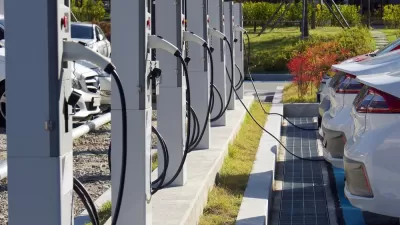C-MORE grants were earmarked for industry trade groups and universities.

Nearly two dozen projects related to measuring and reducing carbon emissions in construction materials have been terminated by the EPA. The grants, issued through the C-MORE program (Construction Material Opportunities to Reduce Emissions) were issued for economic purposes. The goal was to support US construction products to be more competitive both domestically and in international markets that have more stringent emissions requirements.
Reporting on the cuts, Inside Climate News lists the 21 projects whose grants were terminated. Among universities and research projects, many of the grants were earmarked for trade organizations like the National Asphalt Pavement Association, the Portland Cement Association, the National Ready Mixed Concrete Association and others. The list of cuts was provided by the EPA to the Sierra Club through a public records request.
The Inside Climate News article quotes Max Puchtel from the American Institute of Steel Construction, one of 19 trade groups that sent a letter to the EPA in February urging them to maintain the grants.
“This program will drive innovation by funding projects that improve energy efficiency, giving U.S. manufacturers a competitive edge in key industries like automotive, steel, concrete, aluminum, chemicals, and construction,” the letter said. “It will lower long-term costs, boost profitability, and strengthen domestic supply chains, making U.S. companies more resilient and less reliant on foreign suppliers. Ultimately, it will enhance energy independence, secure jobs, and create new opportunities.”
Read Inside Climate News’ full report below.
FULL STORY: EPA Decimates Grant Program Aimed at Measuring and Reducing Construction Material Emissions

Maui's Vacation Rental Debate Turns Ugly
Verbal attacks, misinformation campaigns and fistfights plague a high-stakes debate to convert thousands of vacation rentals into long-term housing.

Planetizen Federal Action Tracker
A weekly monitor of how Trump’s orders and actions are impacting planners and planning in America.

San Francisco Suspends Traffic Calming Amidst Record Deaths
Citing “a challenging fiscal landscape,” the city will cease the program on the heels of 42 traffic deaths, including 24 pedestrians.

Defunct Pittsburgh Power Plant to Become Residential Tower
A decommissioned steam heat plant will be redeveloped into almost 100 affordable housing units.

Trump Prompts Restructuring of Transportation Research Board in “Unprecedented Overreach”
The TRB has eliminated more than half of its committees including those focused on climate, equity, and cities.

Amtrak Rolls Out New Orleans to Alabama “Mardi Gras” Train
The new service will operate morning and evening departures between Mobile and New Orleans.
Urban Design for Planners 1: Software Tools
This six-course series explores essential urban design concepts using open source software and equips planners with the tools they need to participate fully in the urban design process.
Planning for Universal Design
Learn the tools for implementing Universal Design in planning regulations.
Heyer Gruel & Associates PA
JM Goldson LLC
Custer County Colorado
City of Camden Redevelopment Agency
City of Astoria
Transportation Research & Education Center (TREC) at Portland State University
Jefferson Parish Government
Camden Redevelopment Agency
City of Claremont





























